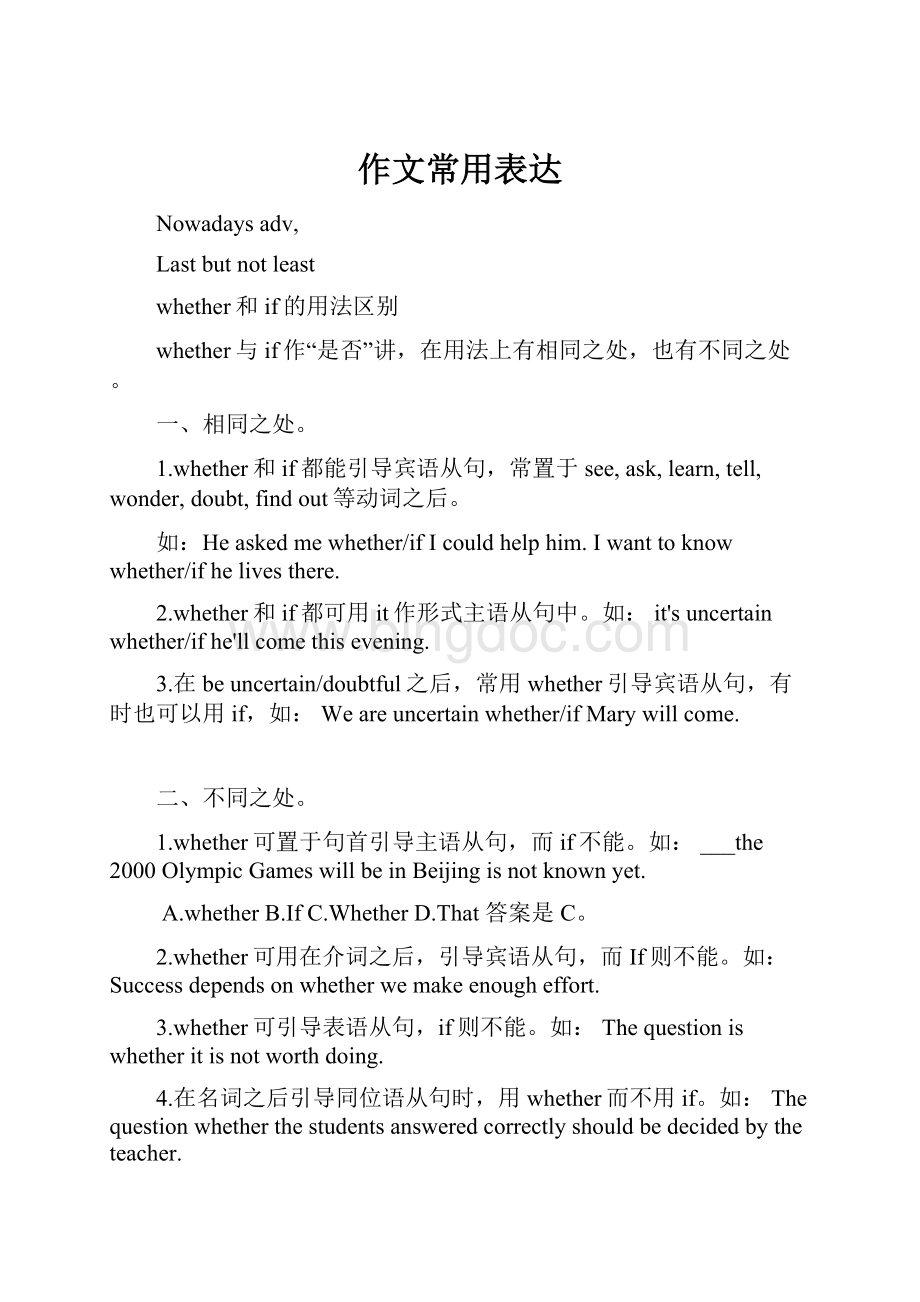作文常用表达.docx
《作文常用表达.docx》由会员分享,可在线阅读,更多相关《作文常用表达.docx(11页珍藏版)》请在冰点文库上搜索。

作文常用表达
Nowadaysadv,
Lastbutnotleast
whether和if的用法区别
whether与if作“是否”讲,在用法上有相同之处,也有不同之处。
一、相同之处。
1.whether和if都能引导宾语从句,常置于see,ask,learn,tell,wonder,doubt,findout等动词之后。
如:
Heaskedmewhether/ifIcouldhelphim.Iwanttoknowwhether/ifhelivesthere.
2.whether和if都可用it作形式主语从句中。
如:
it'suncertainwhether/ifhe'llcomethisevening.
3.在beuncertain/doubtful之后,常用whether引导宾语从句,有时也可以用if,如:
Weareuncertainwhether/ifMarywillcome.
二、不同之处。
1.whether可置于句首引导主语从句,而if不能。
如:
___the2000OlympicGameswillbeinBeijingisnotknownyet.
A.whetherB.IfC.WhetherD.That答案是C。
2.whether可用在介词之后,引导宾语从句,而If则不能。
如:
Successdependsonwhetherwemakeenougheffort.
3.whether可引导表语从句,if则不能。
如:
Thequestioniswhetheritisnotworthdoing.
4.在名词之后引导同位语从句时,用whether而不用if。
如:
Thequestionwhetherthestudentsansweredcorrectlyshouldbedecidedbytheteacher.
5.whether后可接不定式,而if不能。
如:
Pleasetelluswhethertogoorstayhere.
6.在有些动词(如discuss)之后,只能用whether,而不用if引导宾语从句。
如:
Wediscussedwhetherweshouldclosetheshop.
7.在引导否定概念in宾语从句时,只能用if,而不用whether.如:
heaskedmeifIhadn'tfinishedmywork.
Idon`tknowwhetherhewillgo.可以
notonly…butalso…
一、使用notonly…butalso…时须注意的几点:
1.notonly与butalso后面所连接的词的词性必须对等:
(1)Franklinwasconsiderednotonlyaninventor,butalsoastatesman.富兰克林不仅被看作发明家,而且被看作政治家。
(2)Thenursewasnotonlycompetentbutalsokind.这位护士不仅能干而且亲切和蔼。
(3)Theynotonlybrokeintohisofficeandstolehisbooks,butalsotoreuphismanuscripts.他们不仅闯进他的办公室,偷走了他的书,而且还撕掉了他的手稿。
(4)Notonlyyoubutalsoshehastoattendtheceremony.不令你而且她也得参加典礼。
(5)Inproduction,weshouldalwayskeepaneyenotonlyonquantitybutalsoonquality.在生产中,我们不仅要关注数量,而且要关注质量。
(6)Theycompletedtheprojectnotonlypunctuallybutalsoperfectly.他们不仅准时完成工程,而且完成得很出色。
2.notonly只能连用,而butalso既可连用,也可分开用:
a.HespeaksnotonlyEnglish,butalsoFrench.他不仅说英语,还说法语。
b.Televisionisnotonlyboring,butitalsowastesalotoftime.电视不仅乏味,而且还浪费许多时间。
c.Shewasnotonlycompelledtostayathome,butshewasalsoforbiddentoseeherfriends.她不仅被强迫蹲在家中,而且被禁止去看朋友。
3.谓语动词的数应与butalso后主语的数保持一致:
NotonlyyoubutalsoMrZhangteachesinthiscollege.不仅你,张老师也在此学院教书。
4.notonly放在句首,后接句子时要用倒装结构:
(1)Notonlyshouldproletariansemancipatethemselvesbutalsothewholemankind.无产者不仅要解放他们自己,而且要解放全人类。
(2)Notonlydoestelevisionappealtothosewhocanreadbuttothosewhocan't.电视不仅吸引阅读的人,而且也吸引了不会阅读的人。
(3)NotonlywaseverythingAlbertEinstainhadtakenawaybutalsohiscitizenshipwasdeprivedof.爱因斯坦的财产不仅被掳掠一空,而且他的德国国籍也被剥夺了。
(4)Notonlyhadthepoormanbeenfined,butalsohehadbeensenttoprison.这个可怜的人不仅被罚款,而且还被送进了监狱。
二、notonly,butalso的几种常见的变体形式:
1.notonly的变体形式:
常见的变体有notjust,notmerely,notsimply,notsolely等。
(1)Suchworkisnotjustdevaluedinthatcountry,itsnatureiswidelymisunderstood.这种工作在那个国家不但被贬低,而且工作的性质也被许多人误解。
(2)Thereisnotmerelyconcisionintheselinesbutalsoelegance.这些台词写得不仅乘法,而且优雅。
(3)Notsimplydidheteachschool,buthewrotenovels.他不仅教书,也写小说。
(4)Thisnovelisnotsolelysuitableforusinstudyingmodernfictionbutcanalsobeusedintheteaching.这本小说不但适合我们研究现代小说,而且能用于教学。
2.butalso的变体形式:
a:
省去also,只留but;
b:
省去but,只留also;
c:
but…aswell;d:
butalso全部省略。
(1)ScarlettquakedlestsheandFranklosenotonlytheirfreedombutthehouse,thestoreandmill.斯佳丽害怕得发抖,惟恐她与弗兰克不仅会失去自由,而且还会失去房屋、商店及锯木厂。
(2)She'snotonlyanexcellenthousewifealsoafirstclassmathematician.她不仅是一个出色的家庭主妇,而且是一位一流的数学家。
(3)Notonlydoeshewritethewordstothesongs,buthecomposesthemusicaswell.他不仅给歌曲写词,也谱曲。
(4)Suchachangewouldimprovenotonlyhissocialimagebuthishealthaswell.这样的变化不仅会提高他的社会形象,而且会改善他的健康。
(5)NotonlydidIhearthecar,Iactuallysawitcrash.我不仅听见了车的声音,而且还亲眼看见了那辆车撞坏了。
comparewith和compareto
Thesearesometimesinterchangeable,butwhenyouarestressingsimilaritiesbetweentheitemscompared,themostcommonwordis“to”:
“Shecomparedhishome-madewinetotoxicwaste.”Ifyouareexaminingbothsimilaritiesanddifferences,use“with”:
“TheteachercomparedSteve’sexamwithRobert’stoseewhethertheyhadcheated.”
comparewith与…比较,compareto比喻为
compare...with...把……和……比较(常表示同类相比,比较)
compare...to...把……比作……(常表示异类相比,比喻)
①Let'scomparethisarticlewiththatone.让我们把这篇文章和那篇文章作一下比较。
②Theheartisoftencomparedtoapump.心脏常被比作水泵。
compare的过去分词短语形式用作状语时, 不管同类还是异类, comparedwith和comparedto都可以用。
例:
Comparedwith/towesterncountries,Chinausesmaterialsverycarefully.和西方相比,中国使用物资很节省。
themore...,themore
1."themore...,themore..."句型常表示"越……就越……",是一个复合句,其中前面的句子是状语从句,后面的句子是主句。
the用在形容词或副词的比较级前,more代表形容词或副词的比较级。
例如:
①Themorehegets,themorehewants.他越来越贪。
②Themoreshelearns,themoreshewantstolearn.她越学越想学。
2."themore...,themore..."句型,主从句的时态常用一般现在时或一般过去时。
例如:
①Thehigherthegroundis,thethinnerairbecomes.离地面越高,空气就越稀薄。
②Theharderheworked,themorehegot.他工作越努力,得到的就越多。
3.若主句的谓语动词用一般将来时,从句的谓语动词要用一般现在时表示将来。
例如:
①Theharderyouwork,thegreaterprogressyouwillmake.你越用功,进步就越大。
②Thelongerthewarlasts,themorethepeopletherewillsuffer.战争持续得越久,那里的人们受难就越多。
4.若比较级作表语且不位于句首时,可以不用the。
例如:
Whenwearemoreindanger,weshouldbebraver.越是危险,我们越应勇敢。
5.在这种句型中,主句在程度上随着从句变化而变化,常把被强调部分提前。
例如:
Thefasteryourun,thebetteritwillbe.你跑得越快越好。
6.这种句型的特点是前后都可以有所省略。
特别是谚语、俗语,只要意义明确,越简练越好。
例如:
①Themore,thebetter.多多益善。
②Thesooner,thebetter.越早越好。
7.这种句型中的比较部分通常是状语、宾语、表语,也可以是主语。
例如:
①ThemoreEnglishyoupractice,thebetteryourEnglishis.你练习英语越多,你的英语就越好。
②Thebusierheis,thehappierhefeels.他越忙越高兴。
③Themoreairthereisinsidethetyre,thegreaterpressurethereisinit.轮胎里空气越多,承受的压力就越大。
8.若表示"越……越不……"时,常用"themore...,theless..."句型。
例如:
Themoresheflattersme,thelessIlikeher.她越逢迎我,我越不喜欢她。
9.若表示"越不……就越……"时,常用"theless...,themore..."句型。
例如:
Thelessheworried,thebetterheworked.他越不烦恼,工作就干得越好。
forexample,suchas和like
forexample,suchas和like都可用来举例,但用法有所不同。
forexample作“例如”讲时,一般只以同类事物或人中的“一个”为例,作插入语,用逗号隔开,可置于句首、句中或句末。
Forexample,airisinvisible.例如,空气是看不见的。
He,forexample,isagoodstudent.例如,他就是个好学生。
suchas也作为“例如”讲,用来列举同类人或事物中的几个例子。
SomeoftheEuropeanlanguagescomefromLatin,suchasFrench,ItalianandSpanish.
有些欧洲语言来源于拉丁语,例如,法语、意大利语和西班牙语。
BoyssuchasJohnandJamesareveryfriendly.像约翰和詹姆斯这样的男孩都很友好。
like也常用来表示举例,可与suchas互换。
但suchas用于举例可以分开使用,此时不可与like互换。
Somewarm-bloodedanimals,like/suchasthecat,thedogorthewolf,donotneedtohibernate.一些温血动物,像猫、狗和狼都不需要冬眠。
Hehasseveralsuchreferencebooksasdictionariesandhandbooks.
他有几本像字典、手册之类的参考书。
使用suchas来举例子,只能举出其中的一部分,一般不能全部举出。
若全部举出,要改用namely(意为“即”)。
Heknowsfourlanguages,namelyChinese,English,RussianandFrench.
他精通四门语言,即汉语、英语、俄语和法语。
注意:
1.Suchas+名词/动名词,有时也可接动词原形
Don’tdoanythingsillysuchasmarryhim.
Magiciansoftenperformtrickssuchaspullingarabbitoutofahat.
2suchas可与etc.连用
Theyplantedmanyflowers,suchasoranges,lemons,etc.
.
whatever,whoever,whichever,whenever,wherever,however用法归纳
一、引导状语从句
它们都可用来引导状语从句(让步状语从句),其大意为“无论什么(是谁、哪一个、什么时候、什么地方、如何)”等,相当于英语中的nomatterwhat(who,which,when,where,how)。
如:
Whatever[Nomatterwhat]yousay,Ibelieveyou.无论你说什么,我都相信你。
Whoever[Nomatterwho]telephones,tellthemI’mout.不管是谁打电话,都说我出去了。
Whichever[Nomatterwhich]dayyoucome,I’llbepleasedtoseeyou.无论你哪天来,我都欢迎。
Whenever[Nomatterwhen]youcome,youarewelcome.你什么时候来,我们都欢迎。
Wefoundthepeoplefriendlywherever[nomatterwhere]wewent.无论我们走到哪里,我们都发现人们很友好。
However[Nomatterhow]muchheeats,henevergetsfat.无论他吃多少,他都不发胖。
注:
有时从句谓语可用情态动词:
无论他在哪里,我都要找到他。
正:
I’llfindhim,whereverheis.
正:
I’llfindhim,whereverhemaybe.
无论发生什么事都要保持冷静。
正:
Keepcalm,whateverhappens.
正:
Keepcalm,whatevermayhappen.
另外,whoever的宾格也是whoever,而不是whomever,后者在现代英语已基本不用,有的词典已不收录此词。
如:
Whoeveryoumarry,makesurehecancook.
不管你跟谁结婚,他一定要会做饭才行。
二、引导名词性从句
除引导状语从句外,whatever,whoever,whichever等还可引导名词性从句(主语从句或宾语从句)。
如:
Hedoeswhateversheaskshimtodo.她要他做什么,他就做什么。
Iwilljustsaywhatevercomesintomymind.我想到什么就说什么。
Whoeverbreakstheruleswillbepunished.谁违反这些规则都将受到处罚。
I’llgivethetickettowhoeverwantsit.请想要这票,我就把它给谁。
Whicheverteamgainsthemostpointswins.哪个队得分最多,哪个队就赢。
Whicheverofusgetshomefirststartscooking.我们当中无论哪个先到家,哪个就先开始做饭。
三、用于加强语气
有时用于加强语气,含有“究竟”、“到底”之义。
如:
Whatever[Whatever]doyoumean?
你到底是什么意思?
Whenever[Whenever]didyoufindtimetodoit?
你什么时候有空做这事?
Wherever[Whereever]canthechildrenbe?
孩子们究竟会在哪里呢?
Whoever[Whoever]toldyouthat?
到底是谁告诉你的呢?
Whichever[Whichever]didyouchoose?
你到底选了哪个?
However[However]didyouescape?
你到底是怎样逃出来的?
notuntil…
当主句是否定句时,它引出的意思是"直到(某时)(某动作)才(发生)",这时候常会出现"notuntil…"的结构,如果将"notuntil…"的结构放在句首,那么主句要写成倒装句。
例如:
Hedidn'tgotosleepuntil12lastnight.
他昨晚直到十二点钟才睡觉。
Theydidn'trealizetheirfaultuntilwepointeditouttothem.
直到我们向他们指出了他们的错误,他们才意识到。
Notuntilwepointedouttheirfaulttothemdidtheyrealizeit.
直到我们向他们指出了他们的错误,他们才意识到。
NotuntilhecamebackdidIfinishedmyhomework.(直到他回来我才完成作业)
Only所修饰的介词短语、副词或状语从句放于句首,要部分倒装
Onlyonsuchatrip,canyoulearnsomuchaboutEuropeanartist.
Onlybythismeansisitpossibletoexplainit.
OnlythendidIrealizetheimportanceofEnglish.
Onlywhenhefailedinthefinalexamdidhemakeuphismindtostudyharder.
Nowadaysadv.拜请各位牢记这是一个单词,可不是nowaday的复数呀
Lastbutnotleast中没有定冠词
EXERCISES
HowtoMakeaGoodImpressiononsb.
1.提出问题(可从重要性着手)+概括的解决方案35字左右
2.解决问题3点90字左右
3.结论30左右
Janeleaves/makesagoodimpressiononJimmy.
JimmyhasagoodimpressionofJane.
Goodimpressionsplayvitalrolesintheunforgettablemomomentsofyourlife,suchasyourfirs